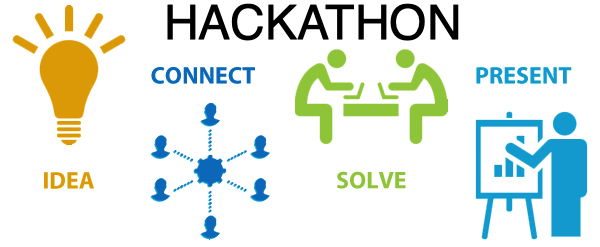Hackathon
What is a Hackathon?
Definition:
A hackathon is an event where individuals, often from diverse backgrounds, come together to collaboratively solve problems, create innovative solutions, or develop software or hardware projects within a set timeframe. The term “hack” in hackathon refers to exploratory programming, problem-solving, and prototyping rather than its traditional association with unauthorized computer access. These events foster creativity, teamwork, and rapid idea implementation.
Analogy:
Consider a hackathon as a sprint for problem-solving. Just as a sprint in sports involves intense, focused effort over a short duration, a hackathon is a concentrated effort by participants to ideate and build solutions within a limited time frame.
Further Description:
Hackathons involve several key components:
Problem Definition: Participants are presented with a problem or challenge that they must address during the hackathon. This can range from technical issues to broader societal problems.
Team Formation: Participants often form teams, bringing together individuals with diverse skills, including programmers, designers, and domain experts, to create well-rounded solutions.
Time Constraints: Hackathons are time-limited, typically spanning a few hours to a few days. This constraint encourages rapid prototyping and innovative problem-solving.
Prototyping and Development: Teams work on developing solutions, whether it’s a software application, a hardware prototype, or a creative concept. Collaboration and quick iteration are essential.
Pitching and Judging: At the end of the hackathon, teams present their projects to a panel of judges or the wider audience. Projects are evaluated based on creativity, functionality, and potential impact.
Why are Hackathons Important?
Innovation and Creativity: Hackathons provide a platform for individuals to unleash their creativity and explore innovative solutions to problems.
Skill Development: Participants enhance their technical and problem-solving skills, learn new technologies, and gain hands-on experience in a short period.
Team Collaboration: Hackathons promote teamwork and collaboration by bringing together individuals with diverse skills and backgrounds to work towards a common goal.
Rapid Prototyping: The time constraints of a hackathon encourage participants to focus on creating a minimum viable product (MVP) quickly, emphasizing practical solutions.
Networking Opportunities: Participants have the chance to connect with like-minded individuals, mentors, and potential employers, expanding their professional networks.
Examples and Usage:
Facebook’s Annual Hackathon: Facebook hosts an annual hackathon where employees are encouraged to work on projects outside their usual scope. This has led to the development of features like the “Like” button.
AngelHack: AngelHack organizes hackathons globally, bringing together developers, designers, and entrepreneurs to collaborate on projects and compete for prizes.
NASA Space Apps Challenge: NASA’s hackathon invites participants from around the world to tackle challenges related to space exploration, using NASA’s open data.
Key Takeaways:
- Hackathons are intensive events where participants engage in a sprint-like problem-solving process, creating innovative solutions within a short timeframe.
- Teams in hackathons typically consist of individuals with diverse skills, encouraging collaborative and multidisciplinary approaches.
- Participants not only work on projects but also enhance their technical, problem-solving, and teamwork skills.
- The time limitations in hackathons foster rapid prototyping and push participants to focus on practical and impactful solutions.
- Hackathons provide opportunities for participants to connect with peers, mentors, and potential collaborators, expanding their professional networks.





